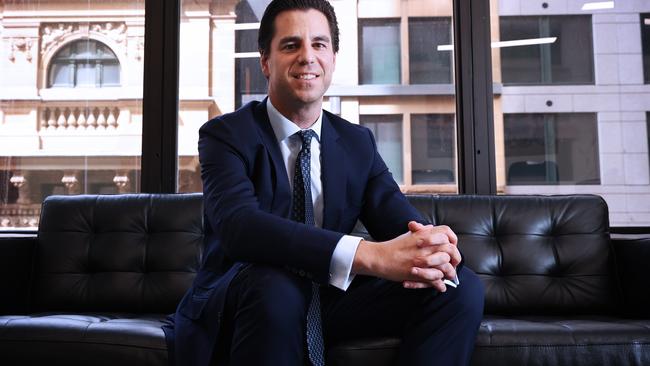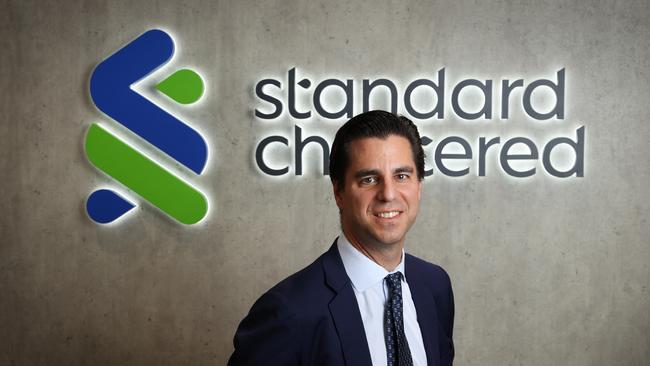Standard Chartered’s new local boss Jacob Berman targets energy, real estate
Spread across 53 countries, Standard Chartered Bank is eyeing local energy and real estate sectors under its new Australian CEO.

Standard Chartered Australia’s new boss Jacob Berman isn’t quick to show his hand, after winning the top job at the local arm of the sprawling trade and business bank in January, but the veteran banker is confident his rivals are about to face a challenge.
Mr Berman has taken charge of Standard Chartered’s Australian business, taking on the role after decades in the London-headquartered bank after working across its Asian operations.
The career banker has been handed a long list of tasks after taking on charge for Standard Chartered Australia, but without revealing the detail, Mr Berman said he has hefty growth ambitions.
“Last year, our business here grew about 40 per cent in income terms, without talking about specific numbers or targets, we see the potential to grow meaningfully in the coming years,” he said.
Mr Berman said Australia’s energy transition and the business opportunities presented were of keen interest to the bank, which is also looking to push its presence in local real estate deals.
“We have to work harder and smarter than everybody else, there’s no there’s no magic to it.”
Mr Berman said the plans were built around Standard Chartered’s clients, who come from all corners of the world.
Few banks can lay claim to such a sprawling footprint as Standard Chartered, which saw its size swell after the acquisition of ANZ’s African and Indian operations.
Mr Berman said the plans were around the “need to activate our network”, noting there was “no magic to it”.
“It’s working to penetrate new customers, working harder with the existing customer base that we have. Trying to bring ideas, different perspectives to that customer base.”
Standard Chartered is a nearly pure play institutional operator, banking major companies and clients in the commercial space, they do not play in the same retail markets for which the big four CBA, NAB, Westpac and ANZ are best known.
But each of these local rivals presents a potential challenger to Standard Chartered, as the sprawling Australian financial giants, along with other global players, are hotly competing for the stable of massive companies.

Mr Berman said Standard Chartered, which boasts almost 100 local staff, had to show its capabilities in deals, with expectations of renewed interest in mergers and acquisitions activity in the Australian market after a lull.
Standard Chartered offers mergers and acquisitions advisory in Australia, alongside lending, project and export finance as well as leveraged finance and some asset financing.
“It’s pretty much a full service corporate institutional bank,” Mr Berman noted.
“Lending is an important driver of that, but our business here is diversified, so it’s not just purely lending.
Mr Berman takes on the role after almost 20 years in international banking, after first joining Standard Chartered in 2012 in Singapore, before moving to Dubai as managing director global banking.
He said the bank is positioning as a player in the energy space, as cash flowed in from around the world to fund new assets or the purchase of existing operations.
Standard Chartered Australia recently participated in a syndicated $400m debt raising for a Victorian battery energy storage project co-owned by Equis Australia and the Melbourne Renewable Energy Hub.
“We are very strong in the battery materials segment, which links to our global strategy around electric vehicles,” he said.
The bank took part in eight mergers and acquisitions transactions in the “green-metal” space last year, with Mr Berman noting Australia’s strong presence in the lithium market opening the door for Standard Chartered to more broadly support the sector with banking services beyond just deals.
“We’re also we’re also working extensively with Australian companies and even some of the foreign companies. They have a meaningful set-up in Australia because the renewables opportunity in Australia is deemed to be very substantial,” he said.
Standard Chartered is also looking to push its market presence in the real estate sector in Australia.
“We’re not necessarily looking to compete too much head on with, with some of the Australian banks who have very, very big real estate finance teams here on the ground,” Mr Berman said.
“We’re selective. We support some of the larger Australian names, but also some of the foreign companies that are investing into real estate in Australia.”
Mr Berman said in addition to financing more of these projects, as well as ploughing cash into warehouse funding activity, Standard Chartered was keen to snap up more business from Australia’s retirement giants in the superannuation space.
“Finally, the banks and brokers segment, where some of the Australian banks have been shrinking their global network, we also have an opportunity to support them more for the cross border flows and activities,” Mr Berman said.
Despite these lofty goals, Mr Berman noted the bank had “flown under the radar” in Australia despite its decades in business in the country.
“We would like to elevate the profile of the institution in Australia and of course ultimately in revenue and return terms,” he said.
“It takes a little bit of time before you can mobilise the resources to deliver on that new strategy.”








To join the conversation, please log in. Don't have an account? Register
Join the conversation, you are commenting as Logout